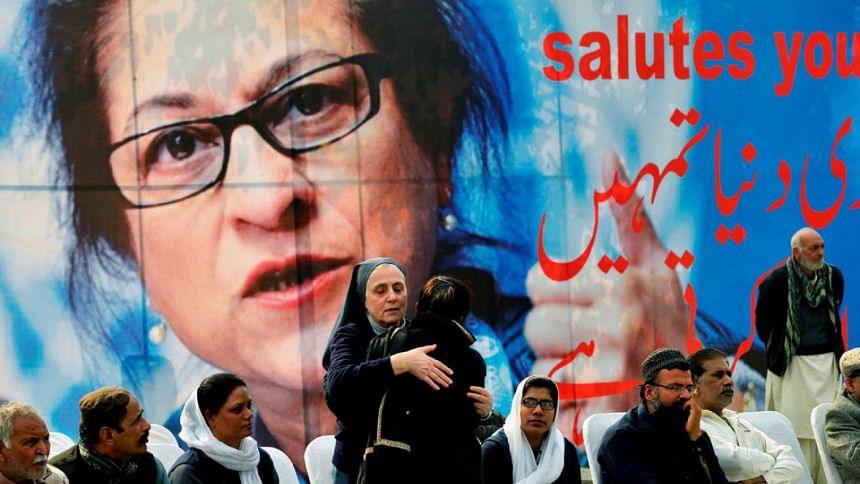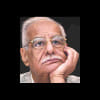Asma Jahangir as I knew her

Asma Jahangir, who passed away last week, was a popular human rights lawyer and social activist. Although her work was confined to Pakistan, her example was followed throughout the subcontinent. The place from where she announced the foundation of Human Rights Commission, an organisation to protect individual rights, also became the venue for meetings to normalise relations between India and Pakistan. I watched Asma putting great efforts to change the influence of religion on society. The bane of problems was the mixing of religion with politics.
Only a few days ago, she rang me from Lahore to say that she would now have more time to work for the normalisation of relations between India and Pakistan after marrying off her daughter. Maybe this was her way of telling that she had miles to go to change a religious-oriented society into a secular one.
Asma can have the satisfaction of having India and Pakistan on the same page even though their reluctance to come nearer to each other was apparent. Asma made Islamabad and New Delhi realise that they had no alternative except to sit across the table and discuss the reasons why the two could not bury the hatchets. Although New Delhi had decided that it would have no talks with Pakistan until the latter stopped giving shelter to the terrorists, Asma believed that there was still some room for a patch-up.
However, Foreign Minister Sushma Swaraj was unequivocal in her statement that New Delhi would have no discussion with Islamabad until it realised that terrorism and talks did not go together. Asma felt that Islamabad faced certain problems with the military which had to be sorted out before any meaningful meeting could take place. She was very positive about the possibility of such a meeting and she could somehow persuade the powers-that-be to see reason.
But my disappointment is that there was little response in India on the death of Asma even though she had dared her country's military, the sworn enemy of India. It was heartening to see her devotion to the cause of improving relations between India and Pakistan. I always supported her efforts.
I was allotted a bungalow as a member of the Rajya Sabha in Lodhi Estate where Asma would bring girls and boys from Pakistan to meet their counterparts in India. Asma named that place the Pakistan House. The boys and girls from Pakistan would shed tears as they would bid farewell to the boys and girls in India. She would also take the Indian youth to Pakistan so they could learn from the society which was tilting towards a particular religion.
Asma, a symbol of Pakistan's human rights and resistance, was also a fierce opponent of military dictators for over four decades. She was also a strong advocate of India-Pakistan peace and was part of several "Track 2" delegations to India. Not only that, she has also had a prominent career as a lawyer after beginning her career as an advocate in the judiciary. She was also the chief of the Supreme Court Bar Association of Pakistan which indicates her popularity.
Even today, the Pakistani judiciary remembers the time when she fought for the restoration of honour to Iftikhar Chaudhry, who was the Chief Justice of Pakistan. The lawyers' movement ultimately achieved its goal and even led to the downfall of President General Pervez Musharraf. That movement which saw the lawyers march in 2007 had given a glimmer of hope that Pakistan was indeed understanding the importance of restoration of democracy. But then every ruler in Pakistan always overlooked the shoulders of the military and it is true even today.
I remember Asma taking on the might of martial law administrator Zia-ul-Haq in the early eighties when she was in the thick of the movement to restore democracy. She was imprisoned for leading the protest movement, but Asma had become a champion activist soon after. There were occasions when her lift was blocked but she braved those threats and continued to stand up against dictators. In the process, she helped establish the Human Rights Commission of Pakistan, which she also chaired later. She would often say that it was the Commission's duty to defend all religious minorities. The Commission during her chairmanship also tackled successfully highly charged blasphemy accusations along with cases of honour killings.
Asma also pioneered the women's rights movement in her country at a time when human rights were not considered an issue in Pakistan. Thanks to Asma, today people, particularly women, talk about their rights and even the political parties, including religious parties, realise the importance of women's rights. The credit for this goes to Asma.
One particular issue that Asma stoutly defended was the Christians charged with blasphemy. Several people from the minority community faced death penalty as blasphemy is an offence that attracted the severest punishment. She was also instrumental in fighting cases relating to the recovery of missing persons free of cost.
Asma won several awards including the Roman Magsaysay and the Peace Prize from the United Nations Development Fund. But for her, awards hardly meant anything. Her sole aim was to restore democracy in the country because of her unwavering belief in it.
Similarly, Asma not just fought for the people of Pakistan but also for people from all over the world, including the Palestine, and the struggles that people faced elsewhere. No doubt, she made a lot of enemies at home because of the battles she chose but she viewed the challenges as something that cannot be ignored. That speaks volumes of Asma.
Kuldip Nayar is an eminent Indian columnist.





Comments